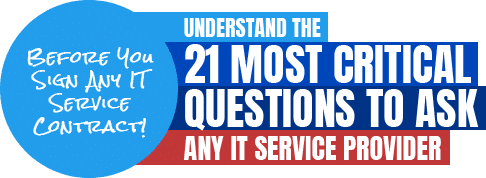
Although artificial intelligence has brought significant benefits to the business landscape, it also presents new security challenges that must be addressed. With AI, malicious actors can target businesses with more complex attacks and on a much larger scale. For instance, phishing emails created with AI are nearly indistinguishable from genuine emails, and may not necessarily trigger spam filters.
Cyber attackers can use artificial intelligence to discover and exploit vulnerabilities within business systems, causing hard-to-detect yet serious data breaches. So, how should you respond to an AI-powered cyber attack?
In this blog, we’ll share some expert tips on how to tackle AI-powered cyber threats and protect your business infrastructure (and reputation) from irreparable damage.
Best Cybersecurity Practices for Tackling AI-Powered Threats
Unfortunately, many businesses still lack dedicated IT service providers. In fact, 47% of businesses with fewer than 50 employees do not even have a dedicated cybersecurity budget. However, there are several ways to boost your company’s cybersecurity posture and protect your company’s assets from AI-powered cybersecurity threats.
1. Provide Ongoing Cybersecurity Training for Your Team

Like it or not, employees are considered cybersecurity risks. Nine out of ten times, breaches occur due to human error. This may happen when employees make ignorant/careless moves that lead to a serious breach.
To make things worse, hackers look for weak links within your employees. However, training them on how to identify security threats (e.g. phishing emails and malicious links) can help curb ignorant actions and save the company’s data and reputation.
Employee security awareness training can take the form of real-life simulations that enable you to observe their behavior if a real threat were in progress. During training, take the extra steps to teach them about new and old types of viruses, ransomware, and social engineering attacks. The idea is to instill a sense of responsibility for the company’s cybersecurity posture.
2. Review and Update Your Cybersecurity Policies Regularly
As cybersecurity threats evolve by the day, so, too, should your cybersecurity policies. Regularly updating your existing policies should take a joint effort between your IT and HR teams. These departments maintain constant touch with employees and are more informed on matters regarding the implementation of new policies and their adoption.
Consistent communication also plays a central role in implementing new policies. Whenever new changes are made to existing policies, employees should be informed of the new threats and solutions via newsletters, emails, internal memos, and other internal communication channels.
Reminder: Don’t fret if you do not have an internal IT team. You can always delegate the role to a trustworthy IT service provider.
3. Partner with a Trustworthy IT Service Provider
Keeping up with the latest developments in emerging AI cybersecurity threats and solutions is no walk in the park! An IT service provider will be much more suited to the role, as these professionals are deeply immersed in cybersecurity.
A seasoned IT service provider possesses all the tools and resources to help you overcome complex AI cybersecurity attacks. With their deep understanding of such challenges, they can help you create and implement solid measures that enhance your cybersecurity posture. That way, you can focus more on your business worry-free.
Download our infographic, “The Business Leader’s Roadmap to AI Success” and discover countless ways AI can improve your business productivity and profitability
Categories
Hear from Philipp Baumann, owner and founder of BoomTech:


